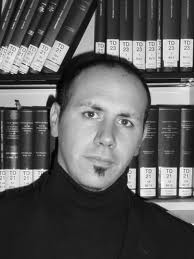Prof. Fausto Fraisopi (University of Freiburg im Breisgau, Germany)
Monday, 15 July, 2024

Lecture
The Task of Reason in 21st Century
Tuesday 2 April 2024
18h – 19h30
Agnes Cuming Seminar Room
School of Philosophy
Seminars
The three seminars will be oriented, in a more technical way, to conceptually outline and define the structures of this form of first philosophy in relation to complexity of reality and in a closer convergence with themes of analytic philosophy such as a structural theory of science, meta-ontology and meta-metaphysics.
1. Phenomenology, Meta-theory and Mathesis Universalis
Wednesday 3 April 2024
17h30 – 19h30
Newman Building
Room E 115
In the first seminar, we will question the possibility of a mathesis universalis as metatheory, as the original project of phenomenology. In a first part, the evolution of the concept of mathesis universalis (and of metatheory of science) within phenomenology, both Husserlian and post-Husserlian, will be expounded in order to highlight its essential link with the concept of Lifeworld defined in the lecture. From this definition we will move on to question the possibility 1) of still thinking of phenomenology as mathesis and 2) of actualising this concept, i.e. the idea of a metatheory of science in the light of the progress of philosophical and scientific knowledge in the last century. This will lead us to define an entirely different concept of mathesis and metatheory from that defined by Husserl as the initial project of phenomenology itself. From this point of view, the concept of metatheory will be related to the problem of metaphysics and to that of the need for a metaphysical foundation of the unity of sciences.
2. Phenomenology and Meta-ontology
Thursday 4 April 2024
14h – 16h
Agnes Cuming Seminar Room
School of Philosophy
In order to define the concept of meta-ontology, we will start from the phenomenological concept of regional ontologies, the early Heideggerian definition of meta-ontology (cf. ’28), and the concept defined by Quine of ontological relativity. The convergence of the frameworks that will emerge from this analysis will allow us to relate the concept of relativity of ontology and the concept of the historicity of ontologies with a broadened perspective capable of integrating the process of evolution and interaction of ontologies with the idea of a meta-ontological model. In the second part of the course, we will focus on the idea of a general grammar for thinking about the interaction and transformation of ontologies in relation to their historicity and in relation to their plurality.
3. Complexity and Meta-metaphysics
Friday 5 April 2024
15h – 17h
Agnes Cuming Seminar Room
School of Philosophy
In the third seminar, the fundamental concepts defined in the previous sessions, namely that of a plastic multidimensionality of the life-world, that of an open meta-theory and that of a descriptive meta-ontology, will be related to the challenge of rationality in understanding the complexity of the world. In the first part we will outline the figures and conceptual elements needed to think from the perspective of history and philosophy of science, above all to measure and conceptually define the distance between the original formulation of a project of rationality (such as that of phenomenology) and its current horizon. In a second step we will proceed to define the structures that determine the nature of a philosophy first beyond metaphysics. To do this we will enter into the contemporary debate, in the analytical field, of meta-metaphysics in order to relate it to the concept of overcoming metaphysics. From this convergence we will proceed to outline the idea of a speculative thought, a “mathesis of instabilities” or “complexities”, beyond the metaphysical foundation of knowledge on an ultimate or fundamental ontology.
UCD School of Philosophy
Room D501 (5th Floor), Newman Building, UCD Belfield, Dublin 4, Ireland T: +353 1 716 8186 | E: philosophy@ucd.ie | Location Map(opens in a new window)UCD Philosophy is ranked among the Top 100 Departments of Philosophy worldwide (QS World University Rankings 2017, 2018, 2021, 2023–2025)